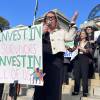Education in the United States is often called the "great equalizer." But now, more than ever, huge gaps are springing up between upper-income and lower-income students.
Eric Schwarz, author of The Opportunity Equation and co-founder of Citizen Schools, attributes those gaps in part to the huge disparity between the amount of money upper-income parents are able to spend -- on tutoring, test preparation, summer camps, and other educational opportunities -- compared to lower-income parents. That ratio used to be 3:1, Schwarz says. Now it's 9:1.
"It means an upper-income kid, by the time they get to the sixth grade in Brookline, they've spent 6,000 more hours with caring adults -- some paid, some volunteer -- than lower-income kids," Schwarz says.
That's where Citizen Schools comes in. Schwarz co-founded the organization in 1995 to bridge the divide in learning time between upper-income and lower-income students by harnessing what he calls "America's most powerful natural asset": citizen power.
Volunteers from a huge variety of fields -- from Google engineers to shiatsu massage therapists to investors to rocket scientists -- run workshops and organize field trips for students in district public schools, often outside the confines of the classroom. Americorps volunteers provide tutoring and homework help.
The work of these volunteers extends the school day from 6.5 to 9.5 hours. To Schwarz, those few hours each day make a huge difference.
"It all really adds up to bringing low-income kids in some of Boston's toughest schools access to the same things that my kids in Brookline take for granted," Schwarz says.
To hear more from Citizen Schools co-founder Eric Schwarz, tune in to the full interview on Boston Public Radio above. To learn more about Citizen Schools, visit their website.



